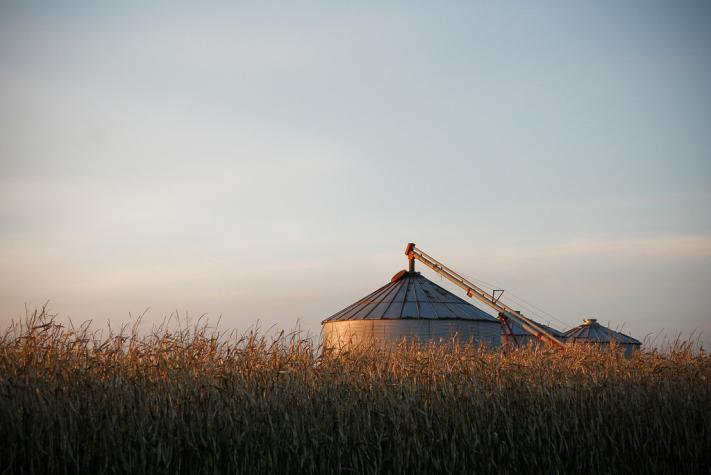TROY, Mo. – Corn planting in 2024 was a tale of two seasons, early and late, requiring special attention to drying and storage, says University of Missouri Extension agricultural engineering specialist Charles Ellis.
Planting got off to a good start this year. Then Missouri averaged more than 6 inches of rain in April, about 2 inches above normal. Parts of western Missouri received more than 10 inches of rainfall.
Corn planted by late April will likely reach black layer by the end of August. However, June-planted corn may not reach black layer until late October to early November, says Ellis.
Delayed planting shortens the harvest window and increases the risk of a killing frost before corn reaches full maturity. Growers with late-planted corn must decide whether to naturally dry down corn in the field, sell at a rate penalized for moisture, or artificially dry grain in the bin.
Successful storage depends on several factors: moisture, pest control, grain temperature and grain quality.
Most farmers will take advantage of good weather to dry down in the field before harvesting. However, they must weigh risks of leaving corn to field dry or early harvest. Corn that does not dry well enough before it is stored can develop mold.
Sell the wettest corn or blend it with drier corn, even though you likely will take a moisture dock, Ellis says. Another option is to feed the wettest corn to livestock.
The amount of moisture in corn can vary greatly and heavily determines drying time and costs.
Ellis says 1,000 bushels of corn stored at 20% moisture contains 3,150 more pounds of water than corn harvested at 15% moisture. By contrast, corn harvested at 25% moisture contains 7,090 pounds of water – more than double of corn testing at 15%. Corn at 25% moisture takes twice as much energy to dry than 20% corn.
Properly stored corn should be at 15.5% moisture by spring and 14% after one year of storage.
There are other factors as well. “At a given temperature and relative humidity, there is a corresponding moisture content where the grain will no longer release moisture. This is called the equilibrium moisture content,” Ellis says.
Horizon Point, a custom weather analysis system designed by MU Extension, provides a grain drying report that predicts the equilibrium moisture content for specific areas and weather conditions.
In short, it tells you when to turn the grain bin fans on and off, says Ellis. See Horizon Point grain drying report.
When drying and storing late-planted corn, Ellis recommends layering grain in multiple bins if available and bins are close to one another to avoid excessive auger movement. Add heat and blend layers to decrease drying time and reduce costs. Be aware that with heat added and no blending of the grain, excessive drying can occur.
Natural air drying is slow and should be done with a maximum grain depth of 18-20 feet in a bin with a diameter of less than 30 feet, says Ellis. Larger depths and diameters result in high power requirements. Keep grain level as it fills and start the fan as soon as the bin floor is covered to prevent spoilage. The maximum starting moisture should be no more than around 20%, depending on weather conditions and bin fan capacity.
Check bins frequently, following safety protocols.
MU Extension offers numerous resources for storing grain, including guides and customized spreadsheets to help farmers make good decisions about storage. Visit MU Extension.
Ellis also recommends these resources from other universities:
- Equilibrium moisture calculator (Clemson University)
- Apps and spreadsheets (University of Arkansas)
- Corn GDD decision support tool (Purdue University)
Photo
Corn grain bin
After a promising start to the 2024 corn planting season, Missouri averaged more than 6 inches of rain in April, about 2 inches above normal. Late-planted corn requires special attention to storage, says University of Missouri Extension agricultural engineering specialist Charles Ellis. Photo courtesy of MU College of Agriculture, Food and Natural Resources.
